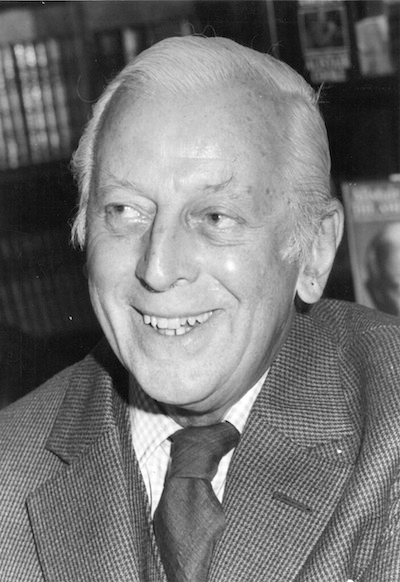It takes Alistair Cooke three minutes, or about 450 words, before he finally gets round to declaring ‘I was there’ — on the night that Bobby Kennedy was assassinated in June 1968. Cooke was talking just a few days later on his weekly Letter from America slot on Radio 4. You might think Cooke would not have been able to contain his excitement that after 30 years on the job as a foreign correspondent he had at last actually been there as an eye-witness to this dramatic ‘accidental convulsion of history’. But, no, Cooke, as the ultimate professional, understood that for us, his listeners, the impact of his account would be enhanced 300 per cent if he gave us a preamble, a slow build. So he begins that extraordinary letter by explaining how it’s too often assumed that foreign correspondents are always there on the spot when bad things happen. Life’s not like that, says Cooke, and it was only by ‘one casual chance in a thousand’ that he found himself not just inside the Ambassador Hotel in Los Angeles, which was jam-packed full of Democrat supporters, but also standing in the small serving pantry that Kennedy was just about to walk through when he was shot.
Cooke began delivering his talks from America on 24 March 1946, and never stopped until ill-health forced him to give up, aged 95 (he died three weeks later). Now, as part of BBC Radio’s 90th birthday celebrations, we can Listen Again to many of these letters. Not just that. In an unusual collaboration with Boston University, which owns Cooke’s papers, we can also look at his original typescripts online, with all their crossings-out and crucial editorial changes.
It’s like a living document of American history: Dallas, Alabama, Vietnam, Watergate, O.J. Simpson, Clinton, Columbine and 9/11. Each week, Cooke took just 13 minutes to explain ‘the springs of American life’ to the rest of the world, moving from the particular — ‘the bullet eyes of Ethel Kennedy turned to cinders’ — to the broader significance of Kennedy’s death: it was squalid, it was appalling, but ‘I don’t subscribe to the sophistry of collective guilt’.
I can’t say I ever really appreciated Cooke when he was on air, having grown up with his programme as a weekly ritual that sounded to me rather pompous and overblown. It was only when he died, and the Letter was no more, that I began to miss his insights into what was going on in the USofA. Cooke, as a Brit who took American citizenship, understood that it is a foreign country, and he looked upon his job as if he was explaining the antics of a strange tribe to the world outside. He never lost focus, or forgot his mission, the economy of those 13 minutes guaranteeing the excision of anything extraneous or too personal to be of relevance.
Danny Baker might live to rue his performance on BBC Radio London last week, which he vowed would be his last. It made a great splash at the time, with commentators declaring it to be ‘magnificent’, ‘magic’, ‘three hours of bloodcurdling broadcasting’. It was certainly strange as Baker launched into a full-scale assault on his employer while playing in the background a piece of sentimental string music that sounded as if it was straight out of Lord Reith’s personal record collection. (Reith was notoriously a fan of the Palm Court Orchestra.)
‘This is the last show I’ll ever do. I’ll never work better than this,’ promised Baker as the strings swooped and swooned behind him. But was it? ‘It’s a dirty rotten shame. And it’s a rotten way they did it. Nobody from this station called me personally at all. Not once.…’ And so it went, on and on and on, for three hours.
Baker probably has been treated badly, and there would have been lots of listeners out there who have experienced exactly the same brutal job loss. But was he thinking about them when he set off on his monologue? Will he really never work again — like many other 55-year-old men who’ve just experienced redundancy? (Baker was back on air on Saturday on Radio Five Live.)
Perhaps what Baker proved, against his will, is quite how indulged radio presenters are, given a free rein to say what they think, even by the BBC. Over on Radio Three, the annual Free Thinking festival in Gateshead began this weekend with a keynote speech by Mary Robinson, the former president of Ireland. She took as her theme the idea that ‘women are best placed to sort out the crises of the 21st century’, not as another assault in the gender wars, but as a simple statement of fact. Where’s the evidence? asked the presenter, Matthew Sweet. They have more empathy, better practical abilities and a greater sense of urgency, argued Robinson.
‘Is Angela Merkel more self-critical, then, than David Cameron?’ Sweet persisted. ‘Let’s get away from talking about individual personalities,’ said Robinson, suppressing, with admirable restraint, the instinct to swat. Now that was magnificent.






Comments